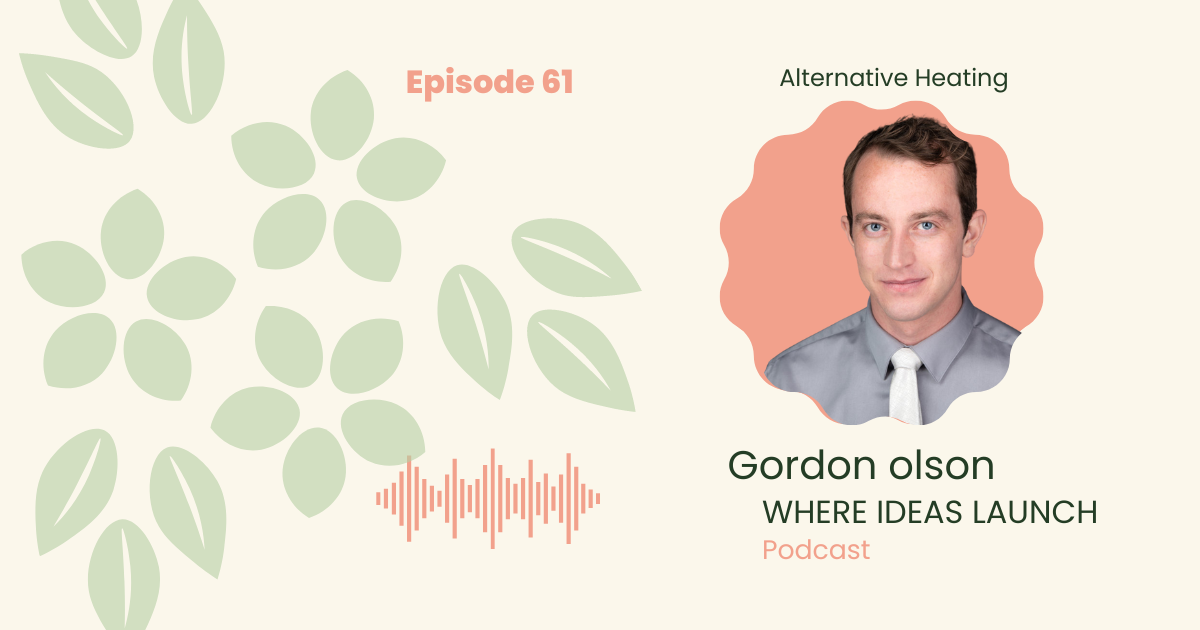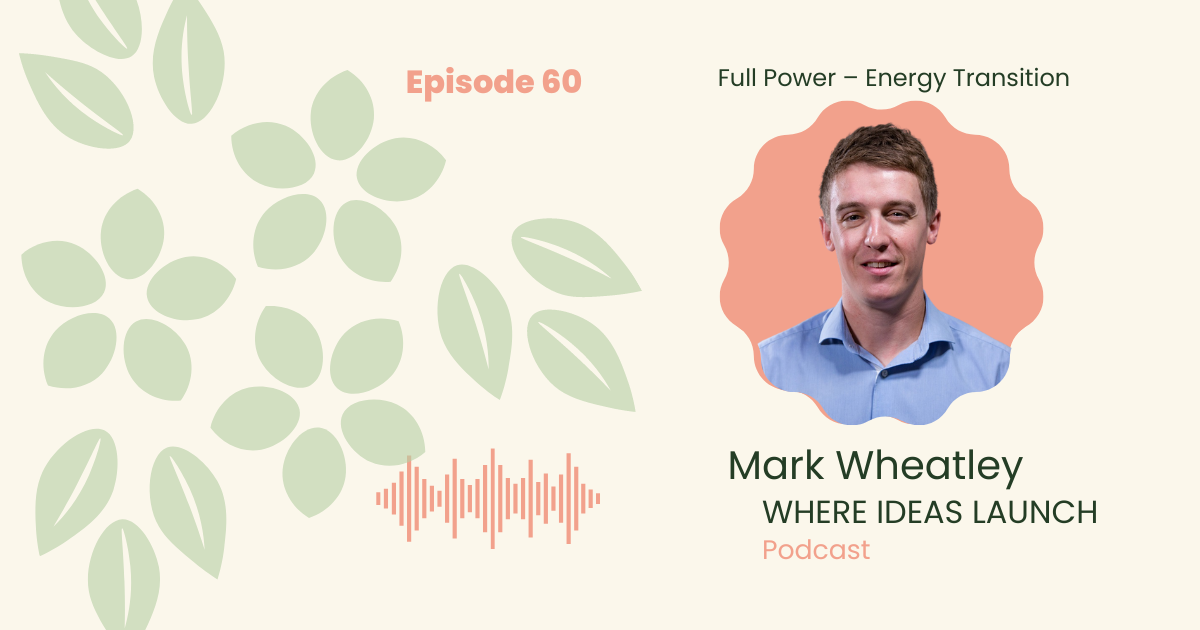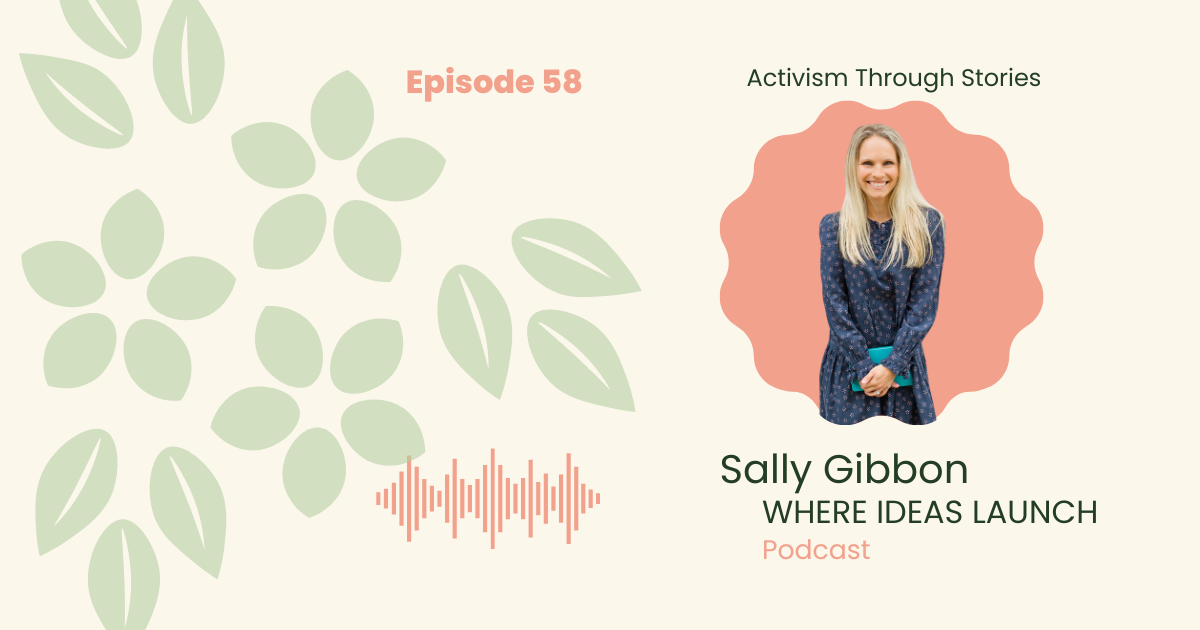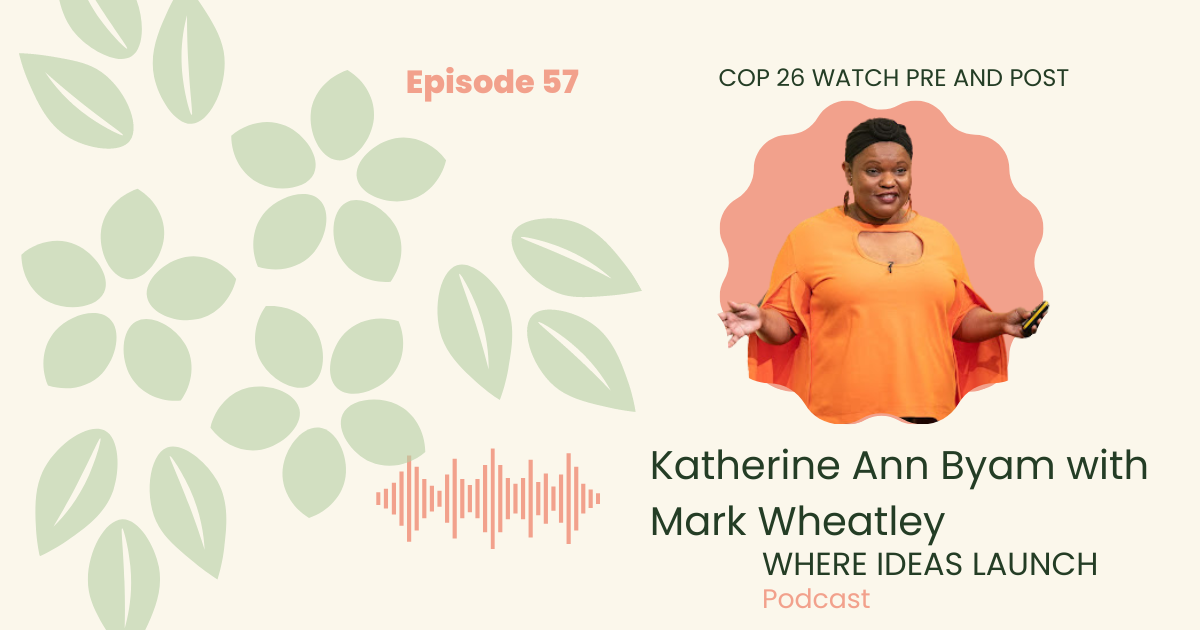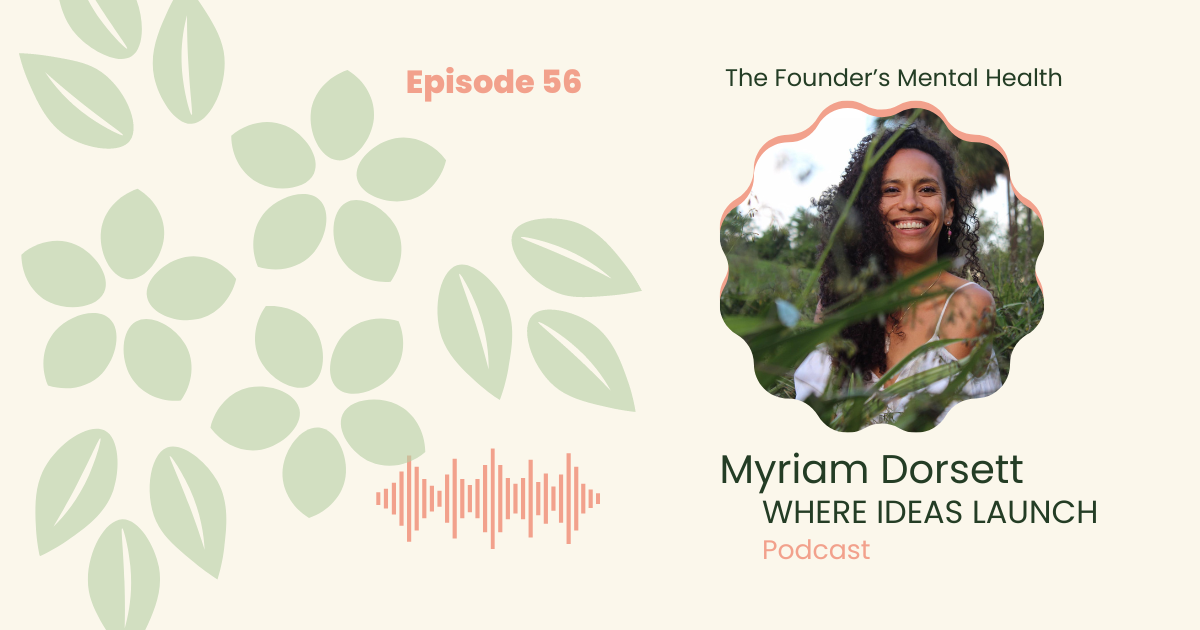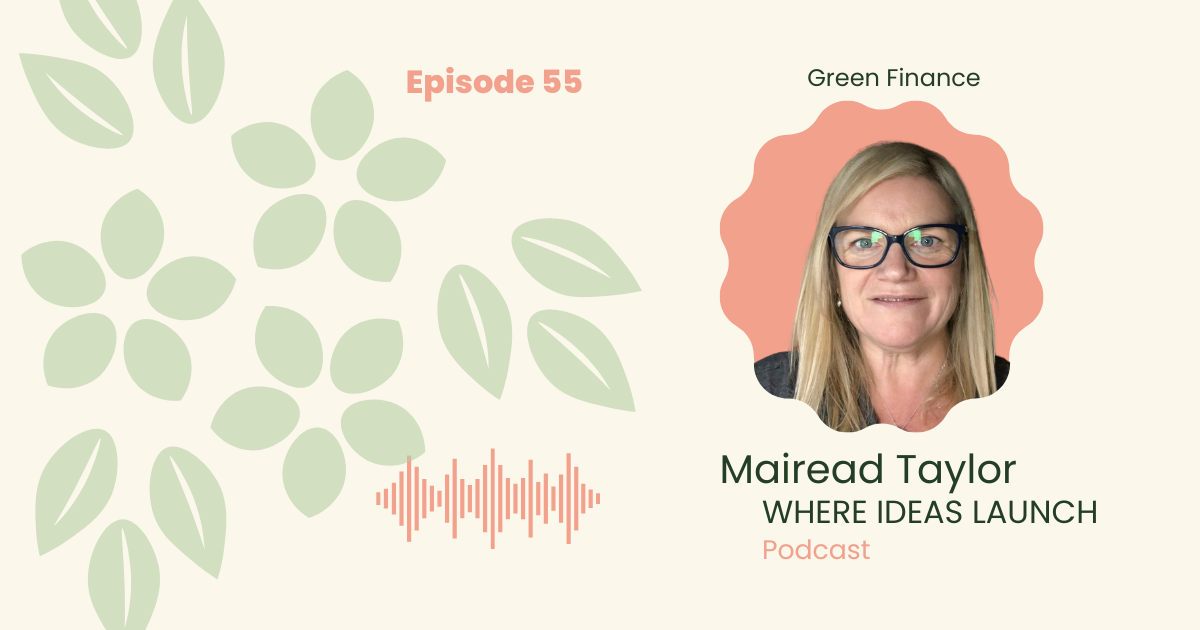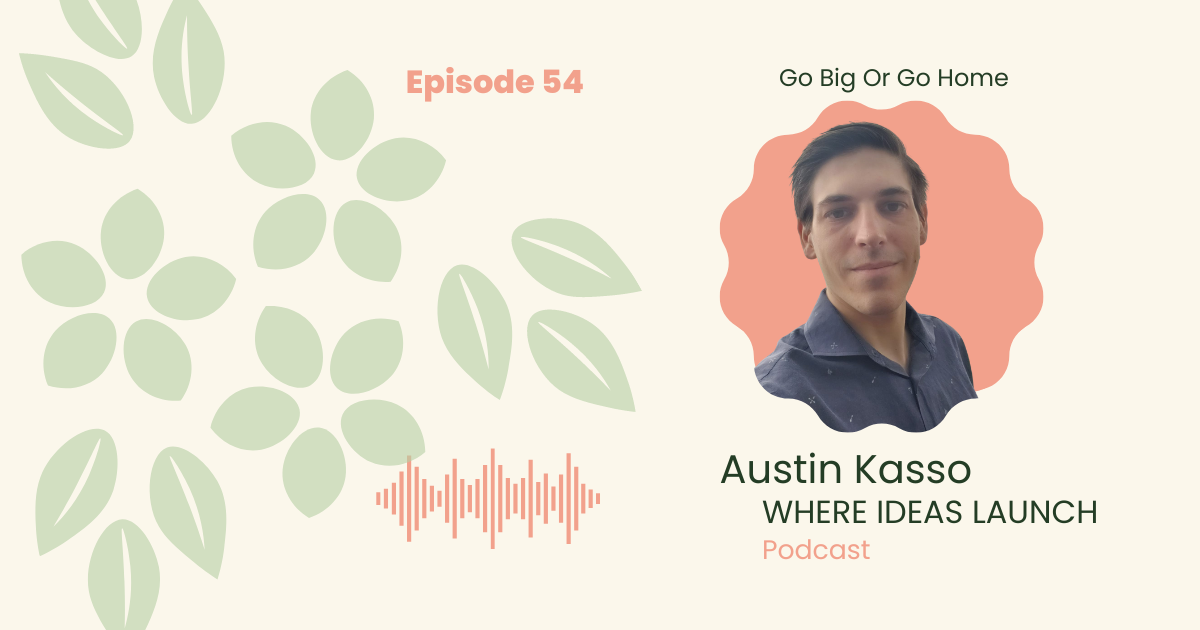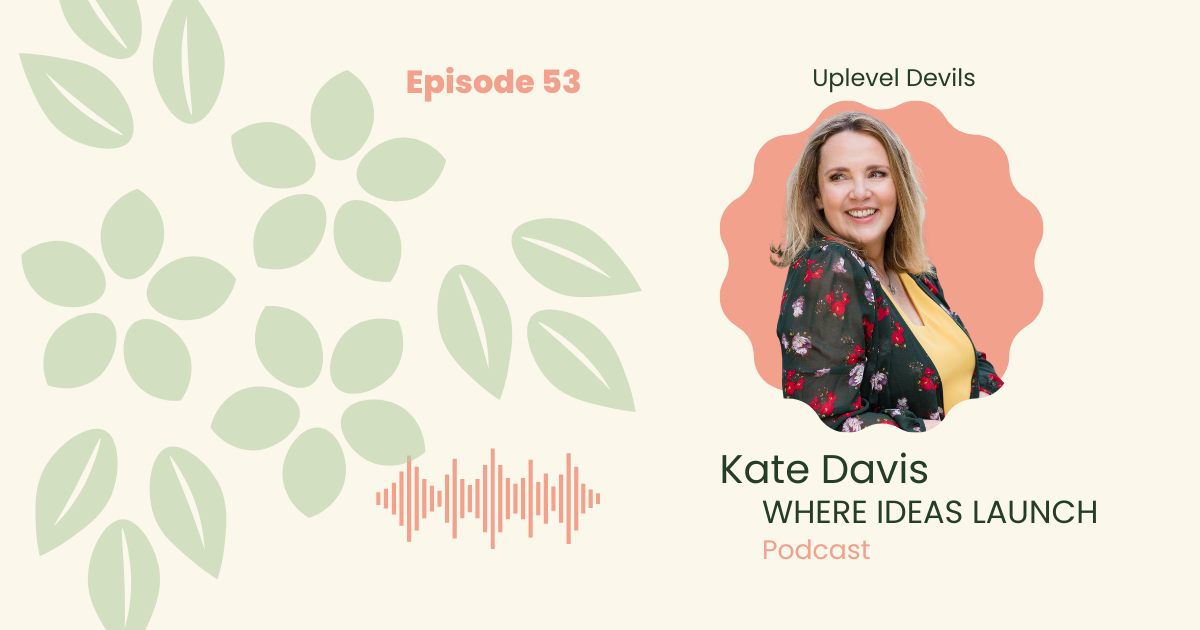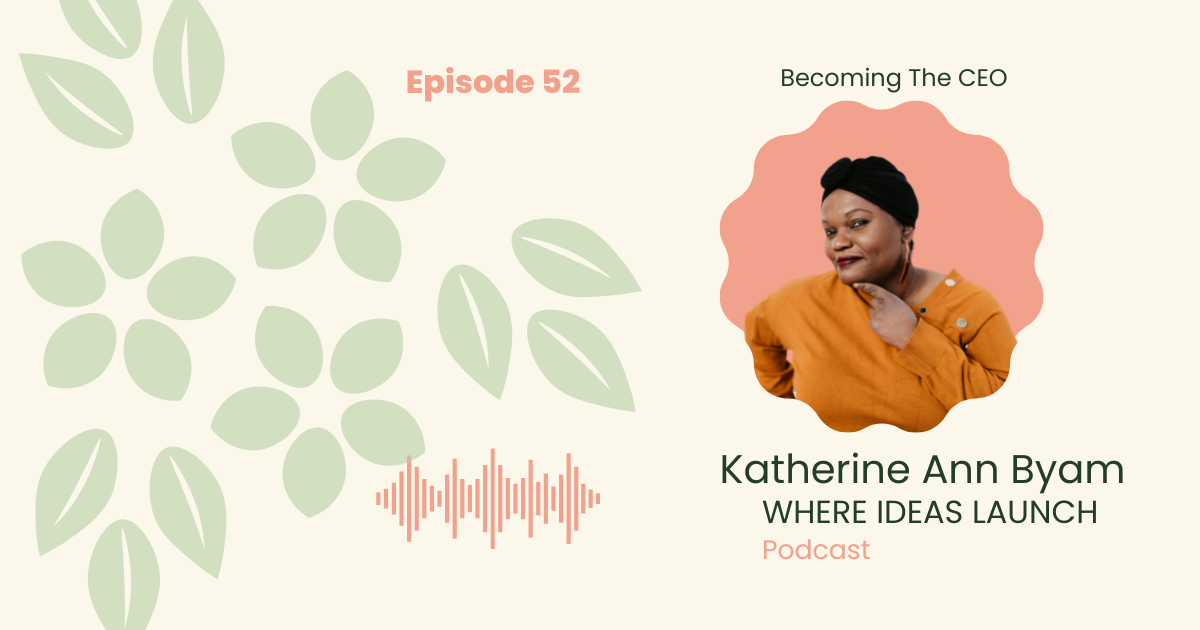About this Episode
Melissa Hobson is a communications consultant with a love for nature and the ocean. Melissa is passionate about making a positive difference to our planet and to people's lives. Combining her passion for the ocean with her extensive PR communications and copywriting experience. She helps charities B Corps and mission driven organisations achieve tangible results. Melissa has worked with companies and charities big and small, both in house and agency for around 11 years, helping them achieve their communication goals. And her brand experiences include just giving Go Fund Me, Cancer Research UK British Deaf Association, marine megafauna Foundation, Madagascar, whale shark project, and more recently guide dogs.
Subscribe to Where Ideas Launch
Episode Transcript
Katherine Ann Byam 0:03
Melissa, thank you so much for joining the show. It's incredibly my pleasure to have you and to have someone with your experience coming to talk to us about this topic of PR in the space of sustainability.
Melissa Hobson 1:40
Thank you. It's my pleasure to be here.
Katherine Ann Byam 1:42
Yeah, it's really awesome. So what inspired your choice of career in communicating for positive impact? Tell me a little bit about your backstory.
Melissa Hobson 1:51
So I'll go back some way. And I think actually, one of the key things that's inspired me, I didn't realise at the time was going to end up being to do with my career. So when I was at university, I went on holiday to Australia, and my travel agent talked me into learning to scuba dive. And I absolutely hated every second of the training in the pool. And I was just like, I need to just get this done. And then I never dive again. Because what is this? Why am I doing this? And then we went out on the boat to the Great Barrier Reef. And just as soon as I got into the open water, everything was just a complete other world. It was amazing. And I just switched and did a complete 180. And I was like This is incredible.
Like, you know, I saw sharks, we saw turtles, they were just fish everywhere, these beautiful corals. And at the time, I kind of thought, well, this is cool, but I was living in Bristol at the time. So that's a shame, I won't be able to do that again. And then over the years, I went on holiday by the coast, I managed to go diving. Then I started planning my holidays to go diving.
Then I started writing for a scuba diving magazine, kind of on the side around my PR work. All this time I was doing PR originally for a big consumer agency and then moving kind of towards the charity space. So I work for Cancer Research UK. And then I worked agency side with as you mentioned JustGiving Funmi, various other cause based organisations.
And then I got to the point that I’d been in London for about a decade, I needed a break, and I quit my job with nothing to go to at the time. An amazing opportunity came up after I'd quit or while I was working my notice period to move to Mozambique and help a marine conservation charity. So that's the marine megafauna foundation. Mmm. And I spent about eight months volunteering with them out in Mozambique. And that was kind of the big step I guess into marine conservation specifically and sustainability, which is my core niche kind of around other charity stuff that I do as well.
Katherine Ann Byam 4:15
Yeah. Now that's a really powerful story. And I think reefs do have this effect on people definitely as a child. You know, the twin island of the republic that I come from Australia and Tobago and Tobago has used to have really beautiful reefs, and we would travel there as kids and stuff and even as a little kid you can get out there not with any snorkelling device because it was so easy to access, and eventually has been bleached, like a lot of other coral reefs around the world. So it's incredibly powerful to witness that in your lifetime. Something that you'd never expect.
Melissa Hobson 4:51
It's such a shame, isn't it to see you know, within a few years the landscape completely changing for for the negative yeah
Katherine Ann Byam 5:00
Yeah, so it's definitely a cause that we all support. I think anyone who lives near an ocean, I definitely am an island girl myself. So it's definitely a cause I support. And you've worked in some really amazing campaigns with some great brands. Can you tell us a little bit about your favourite impact campaign and why it was so important to you?
Melissa Hobson 5:20
Yeah. So we were chatting before and you said, Oh, this is going to be a really easy question. And actually, this is probably the hardest of all the questions you've given me. I've worked on some amazing campaigns and with various kinds of charities and organisations and I've been thinking about this for a few days. And everyday, I changed my mind about which campaign I'm going to tell you about. So there was one, originally I was going to talk about, which I just touched on briefly, because when I was at Cancer Research UK, I was involved in the no makeup selfie campaign, which I don't know if you remember, people were taking photos of themselves, or then without any makeup on and tweeting it, basically.
And what was really amazing about that was, it wasn't actually our campaign, people were just doing it to raise awareness of cancer research, small C, small R. And our social media manager at the time, was, I think, in the evening at home on call because we had a rotor of covering out of ours. And he jumped on it and just sent out a tweet saying, you know, by the way, this isn't us. But if you would like to support Cancer Research UK, the charity, then you can do so. And the next day, the team scrambled around, and we actually had an unused Text to Donate number.
So we tweeted out the text to donate numbers. And that was it. The phones just didn't stop ringing from that point. And I think what was amazing about that campaign, apart from the fact that we raised something like 8 million and in about a week. And it just kept going. But from a PR perspective, I was playing just a very small part in the team kind of managing the press response to that. It was so measurable, which usually NPR, you know, we talk about it being such an important piece of the puzzle.
But you know, digital marketers will have stats around, you know, social media and retweets and how many views and all that kind of thing, which PR can be really unmeasurable. So this was a campaign that was really exciting to see a communications campaign that had a direct tangible impact. And we knew every penny that came into that number was because of the no makeup selfie, because it just kind of sitting dormant, the number otherwise. So. Yeah, so that was one that was kind of exciting to be involved in, even though I was Yeah, just a very tiny piece of that puzzle.
Katherine Ann Byam 7:50
It's such important work as well, I can't, can you describe what it feels like to have been involved in something so game-changing.
Melissa Hobson 8:01
I mean, at the time, it was just hectic. We had Cancer Research UK, a brilliant organisation, and they have a fantastic comms team. And we probably had 10, or more than 10 members of the team kind of working on comms at that point. And it was just tools down on everything else. You know, it was completely overwhelming. The social media team were just flooded with tweets that were, you know, responding to engaging with sharing, but from a PR point of view, obviously, news organisations were picking up on it.
So they wanted the press release, they wanted the latest figures every morning, we were trying to check, you know, what's the donation gone up to now and it might have raised an extra million or a couple of million. Obviously, also being conservative that with Text to Donate campaigns, the figures are slightly in flux, because people might then decide not to pay that donation when their phone bill comes through.
So there's a little bit of that as well, but also getting, you know, finding which aspects people were free getting them onto TV onto radio doing comment pieces. So it was literally I mean, yeah, working in a bit of a call centre at that point, as soon as you put the phone down, it was ringing with another journalist. So it was just everyone really working together and just powering through to try and spread the word even further as much as we could. So it was exciting. But it was exhausting. Once that couple of weeks wrapped up and we suddenly realised your to do list had been on hold for probably a good two weeks. We didn't really, you know, have the time to focus on anything else. It was a lot but it was incredible, as you say,
Katherine Ann Byam 9:48
and I guess it's probably the reverse of what happens normally when you're trying to book that spot. You know, you're trying to get the news media to take the story, but now it's really them coming To you, and I guess this is the beauty of a fantastic campaign.
Melissa Hobson 10:04
Absolutely. And I think also one of the things with that campaign was, the reason I think it worked really well is that we didn't create it. I know after that happened, and there was another there was the Ice Bucket Challenge, there's been a couple that have gone really big. And the ones that do really well have come from real people and just taken off. And I know for, you know, when I left Cancer Research UK, and I went to my next agency, there was often you know, clients would say, Okay, how do we do the next no makeup selfie. And there are things that you can try to do. And there are ways you can try to create a really strong story. But I think sometimes the ones that just really take off are the stories, they're already, it's already happening. And it's how you engage with it. And, you know, don't force your way in, because I don't think that works. But if you can make yourself a relevant part of that story and use that as a way to tell your own story. And I think that can be, you know, a really successful campaign.
Katherine Ann Byam 11:02
Yeah. And just going more into the whole topic of PR. So we had a conversation actually recently, sort of by text inside my group and my community because I realise that a lot of people in the sustainability space or at least as small businesses, in women in sustainable business at the moment, they're not necessarily aware of the power of PR. And maybe there's a perception about greenwashing about PR. Do you want to speak to that a bit about why people may have that perception and how to use PR for good?
Melissa Hobson 11:41
Yeah. So I think the first thing that I find when I'm working with new clients who haven't done any PR before, and often that's a small startup or a solo business owner who's kind of launching their company, and they might come to me for a Power Hour. So you know, 60 minutes delving into, what's their issue that we want to overcome from a PR perspective, and often with those people is not so much necessarily what is PR, they probably have a bit of an understanding and awareness of it. But people feel really, really nervous about it. And I think part of it, I think, is in the sustainability space.
The greenwashing point that you mentioned, I think people are really nervous about any clap back, you know, what if I say the wrong thing, or, you know, do the wrong thing. And I think also, there's, as soon as you're speaking to a journalist, a lot of people just get really nervous, you know, they're happy to I've seen clients who will have a long conversation with you telling you all about their company, and what they do, and they're really eloquent and passionate.
And then, you know, say in their head, even in a mock interview situation, you're saying, Okay, so now I'm a journalist, and we're going to practice running through these questions, and they just freeze. And I think there is something that people, yeah, and nervous about the media, they sometimes forget that journalists or people do. And I can say that because, you know, on the side, I do have put my journalist hat on now. And again, even if it's mainly writing about fish and things underwater.
But I think it's kind of getting people comfortable with the human element of PR, it's, you know, sharing your story with other people in a way that, really, a lot of the time, your goal is thinking about the type of story that if you come down to the pub, or the coffee shop, or wherever you meet your mates, and they say, oh, did you see that thing where, you know, and it might be an amazing fundraising challenge.
Or it might be some epic photos of marine life that they've never seen before, whatever it might be. That's kind of the end result that you're really working towards. So thinking about it, like that, and then working back and thinking, you know, what do I have to tell that I'm passionate about and that people are going to be really interested in. And I think that makes it more, more manageable. You're just trying to tell your story rather than kind of do PR in, you know, quote, unquote, that intimidating way.
Katherine Ann Byam 14:27
Exactly. And that's the thing you can do really organic forms of PR, just on your social media, and then it's a matter of it being picked up by the press. Sometimes it's just as simple as that as well.
Melissa Hobson 14:40
Absolutely. And social media is a great tool, particularly if you're new to PR. And there are things like the hashtag Chennai request, you can put that into your, you know, Tweet Deck or just search it on Twitter, and you'll see what journalists are looking for. So you don't necessarily need to have the big two databases and all those kinds of things that maybe a consultant or an agency might have access to, you know, you can keep an eye on little things like that.
And it might be that a journalist is, you know, at the moment, we've got the budget coming up. So journalists might be looking for people to talk about how changes in the budget are affecting them. And there's going to be a lot of stuff that's not relevant to you. But it might be that they're talking about green energy, they're talking about, you know, some of the things that are happening at COP 26, when that comes up next week, and you might have a really pertinent point on there. And yeah, you know, drop them a tweet back, give them a little introduction to you and what you do, and that can be a really great way to kind of start getting in touch with the media and putting yourself out there. Yeah,
Katherine Ann Byam 15:48
no, absolutely. And I wanted to ask you the next question as a positive question. But unfortunately, we've had some actually really crap news, literally crap news about what's happening with the voids and, and putting sewage into the wards in the UK and stuff like this. I guess what I want to ask is maybe I'll make it a two part question. What are your thoughts on what's kind of happening at the moment? But what are sort of the positive signs that you're getting about how we're going to care for the oceans in the future? What, what, what do you think gives us a reason to be encouraged?
Melissa Hobson 16:23
Yes. So to the first part of your question, to the first part of your question, in terms of the way things stand at the moment, I think it's very much a sliding scale, you know, when you turn on the news, or you listen to the radio off, and we're hearing more about the bad things that are happening, the ways that we're destroying the planet, which is a huge concern. And I think there is a lot of change that needs to be done. And I think it's going to be really hard work.
That said, I do think we're starting to see a groundswell in terms of people that care, people that want to make a change, whether that be some of the amazing business owners that you work with, who are starting, you know, with sustainability at their core, trying to change the system, and you know, the cultures that we've been brought up in, or whether that be a family that are thinking a little bit more carefully about their waste, they've, you know, planted a vegetable patch in their garden, or whatever it might be all the small steps are really important as well.
From a communications perspective, I've definitely seen lots more companies thinking about sustainability. Some of that, if I'm being cynical is probably from a, you know, there is greenwashing out there, and potentially people thinking, this is going to be good for our brand for us to look good. So that's why we need to do it. But if that is why they're doing it, I think it's important that they are still doing it right. You know, even if their motivations aren't necessarily pure, we are seeing more people trying to make a change. So I do think we've got a really big challenge ahead of us. And I don't know exactly where we're going to end up. But hopefully, I think, you know, there's some really positive things going on. And I hope that that continues.
Katherine Ann Byam 18:29
Are there any things that you want to highlight that are really going well, for the ocean in particular?
Melissa Hobson 18:34
Yeah, I think I told you before, Catherine, if you asked me about fish, I just go off, so he might have to cut me off if I get too excited. But there are some really amazing campaigns going on. So as I mentioned, I'm working with or used to work with mmf and with the Madagascar whale shark project as well who do incredible work into the ocean giants megafauna in our ocean, you know, looking at populations and also looking at how, you know, how is tourism behaviours affecting these populations.
Stella, who's a good friend of mine who runs the Madagascar Wireshark project, is doing a lot of work into codes of conduct in the area. So making sure that boats don't go too fast. Don't go too close, you know, you're not having loads of people jumping on the animals getting all excited to see the sharks because it's a great way to raise awareness. Like, you know, seeing these enormous creatures in front of you in the ocean is absolutely spectacular, but we do need to do it in a responsible way. So charities like that are doing some amazing work. The Manta trust as well I know is doing some amazing work around responsible tourism. And then there's also things closer to home in the UK.
There's a big seagrass planting project that's been going on. Seagrass is a really important carbon sink. And it's often overlooked, because people are talking about coral and coral reefs. And so lots of great seagrass projects are going on. And then there's also and this, I promise, I'll stop after this.
There's also lots of citizen science projects that people can get involved with. So, again, thinking about the UK, if you're on the coast, and you're having a little beach walk with your dog or with your kids or whatever, you might spot mermaid purses, I don't know if you've ever heard of them, Katherine. So mermaids' purses, their little black look almost like packets. And they are the egg casings of sharks and rays. And they're called mermaid purses, I presume, because they look like a teeny tiny pass. And the shark trust is doing some amazing citizen science work around those.
So if you see one, you can take a photo of it, and upload it to their database, and basically help them work out which sharks and rays are laying eggs in the area, which obviously helps them with things like population studies, and all that kind of thing. Just by uploading a photo. So something like that is something that, you know, anyone by the coast can do. You just need to keep your eyes peeled, maybe pop your phone away while you're working and walking and you know, have a little look at the pebbles or the sand and see what you can find.
Katherine Ann Byam 21:25
Oh, that's a really powerful story. So my last question, or second to last question, actually is what's next for you?
Melissa Hobson 21:34
Good question. So it's been a really busy time for me. And I'm actually, from a professional point of view, I'm booked up until 2022, which is a bit scary, and also quite exciting. So I'm continuing to do some work with guide dogs, they've got some incredible campaigns coming up. And I'm also going to be starting some work in the coming weeks with another marine conservation charity, I'm sure there will be other things popping up. There's always exciting projects on the horizon.
And then from a personal point of view, I'm heading up to Glasgow, on the train next week for cop 26. So hopefully going to meet some really exciting environmentalists and activists kind of during those couple of weeks, and then into 2022. I'm not sure if I mentioned but when the pandemic hit, I was living abroad. I hadn't been living in the UK for quite a few years at that point. So I was brought back to the landlocked town of Redding. Initially, obviously, thinking it would be temporary. But that's rolled on for a little while. So I think next year, I'm going to be trying to find my way back to the coast as well
Katherine Ann Byam 22:50
As I live on the coast, but it's not the world's best coast, I get to see container-ships.
Melissa Hobson
Whereabouts are you?
Katherine Ann Byam
I'm in Southampton. So there's an entire side of the coast that we don't actually get to access at all. Because there's a marina. And then there's the area that the boats that cruise ships come in, and there's the area that sort of passenger ships come in for the wide. And then there are lots of containers, you really have to work hard to find the actual ocean. Which is amazing. So the last question that I wanted to ask is, is it to give advice and advice for people who are budding copywriters, who are bloggers and who really want to get that impact message across? Because I think what we struggle within this space? No, my guess is what we struggle within this space is that we're all very passionate, that's for certain, but we struggle to be able to communicate to get the people who are not as passionate to convert. So what advice or tips would you give?
Melissa Hobson 23:56
Yeah, good question. So I'd say and I think for me, this is probably relevant. across the different comms disciplines, whether you're a PR person or a copywriter or marketer of some description, is to really come from the point of view of your audience. So that might be your customers or, you know, a specific target target group that you want to, you know, engage and maybe kind of try and start changing their behaviours. And to be able to do that you really need to understand who they are and what makes them tick.
So, first of all, thinking about, who are you talking to? Because if you don't know, and if you're still at the point that you've got a great message to share. That's amazing. And, you know, there's some really passionate people doing some brilliant stuff. But who do you want to tell that message to? And maybe you know, why that specific group of people because it might be that you mentioned, Katherine, you know, it might be a group of people who aren't at Actually not involved yet in sustainability.
So telling them that it's better for the planet, and you know, this, that and the other, it's gonna save the turtles like, they might not care. You know, there are people, unfortunately, that don't care or that they have other pressing matters that are priorities for them. But, you know, if you're thinking about what actually makes them tick, it might be, for example, thinking about the energy crisis and insulation and green energy and all of that. Maybe, for them, protecting the planet isn't going to be a big influencer. But saving money on their bills, so that they have a bit more to spend looking after their family might be a really big influencer. So I think coming from their point of view, and trying to understand what makes them tick is then going to help you really work out how to weave your message in a way that resonates with them.
Katherine Ann Byam 26:00
Yeah, that's really great advice. I think, when I started this podcast, my mission was to take organisations, leaders and organisations who weren't even thinking about sustainability yet, and try to take them along a journey. So that was the reason that I started and that I had so much business focus on the message I was carrying as well. And now I think, you know, I've moved people a lot in three seasons. And I feel as if people are ready to be on any journey that I'm on, which is, which is great, that's exciting. But I can feel like I've done that, at least with the few people who stayed with me.
Melissa Hobson 26:40
And it's funny, because as well, I think one of the reasons I've been quite busy recently is because, you know, we had the IPCC report, we've got cop 26, coming up, everyone suddenly talking about sustainability. And so they come to you, as you know, a PR person copywriter with experience in conservation and sustainability. And often one of the first questions is, okay, so you've got great contacts with the sustainability press, right? And I'm like, Well, what actually, we maybe should be asking is, you know, why do you want to contact the sustainability press? Like, that's maybe an element of what you want to do.
But if you're a sustainable beauty brand, we need to look at the beauty press, if you're working, I'm working with a sustainable lingerie brand at the moment called Confident Tiger. And they're brilliant. But our focus there is with fashion titles with women's titles with entrepreneur titles, you know about the founder herself? And obviously, yes, you know, there is a sustainability element to it. But it's really important not to get stuck in that echo chamber of, you know, I love all my echo buddies, and we can all chat about the planet. But actually, you know, we need to break out of that and start to get this message seeping through all the other types of media as well, because that's when it starts to affect wider change.
Katherine Ann Byam 28:01
Absolutely. We need to nudge and we need to nudge with a shelf. Thank you so much, Melissa. This has been a fantastic conversation. Thanks for joining the show.
Melissa Hobson 28:11
Thank you for having me.
